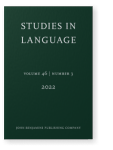Vol. 46:3 (2022) ► pp.718–751
Weather expressions in Basque
A typological perspective
We make two claims regarding weather expressions in Basque: first, based on Eriksen et al.’s (2010) typology, we show that Basque tends towards the argument type (and less frequently so to the predicate-argument type) when coding dynamic (precipitation or other) events and to both the argument and the predicate type when coding static events; Basque often has transitive structures (i.e. both transitive predicate and argument transitive types), apparently a rare typological feature. Second, with respect to two key issues in the study of weather predicates within Generative Grammar, we claim (a) that Basque supports the view that both lexicalizations of weather verbs (unaccusative and unergative/transitive) are possible across languages, as argued by Bleotu (2015) and Levin & Krejci (2019); and (b) that the empty pro subject of Basque transitive weather constructions is closer to a quasi-argument (Chomsky 1981; Levin & Krejci 2019) rather than to a true expletive.
Article outline
- 1.Introduction
- 2.Weather expressions and linguistic typology
- 3.The place of Basque weather expressions in linguistic typology
- 3.1A description of Basque weather expressions
- 3.1.1Weather expressions with intransitive verbs
- 3.1.2Weather expressions with transitive verbs
- 3.2The place of Basque within EKK’s typology
- 3.1A description of Basque weather expressions
- 4.Grammatical theory and weather phenomena
- 4.1The issue of unaccusative and unergative verbs
- 4.2The issue of the subject of weather expressions
- 5.The contribution of Basque to the theoretical issues on weather expressions
- 6.Conclusions
- Acknowledgements
- Notes
- Abbreviations
-
References -
Sources of examples
